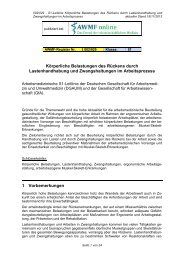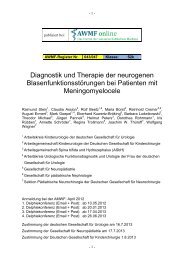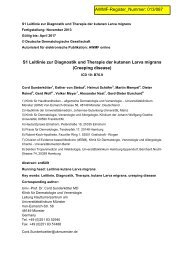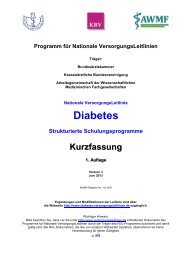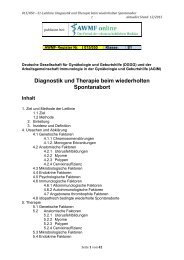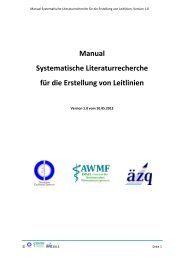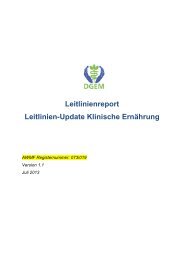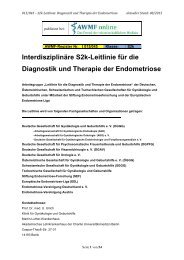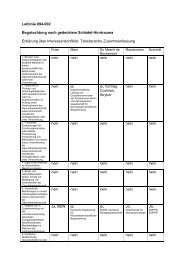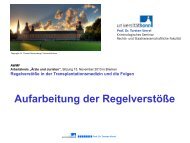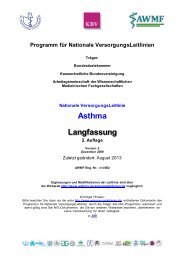S3-Leitlinie Demenzen (Kurzversion) - AWMF
S3-Leitlinie Demenzen (Kurzversion) - AWMF
S3-Leitlinie Demenzen (Kurzversion) - AWMF
Sie wollen auch ein ePaper? Erhöhen Sie die Reichweite Ihrer Titel.
YUMPU macht aus Druck-PDFs automatisch weboptimierte ePaper, die Google liebt.
Literatur 51<br />
24. Hachinski V, Iadecola C, Petersen RC, et al.: National Institute of Neurological Disorders and Stroke-<br />
Canadian Stroke Network vascular cognitive impairment harmonization standards. Stroke 2006; 37: 2220-<br />
2241.<br />
25. Rascovsky K, Salmon DP, Hansen LA, et al.: Disparate letter and semantic category fluency deficits in<br />
autopsy-confirmed frontotemporal dementia and Alzheimer's disease. Neuropsychology 2007; 21: 20-30.<br />
26. Gainotti G, Marra C, Villa G: A double dissociation between accuracy and time of execution on attentional<br />
tasks in Alzheimer's disease and multi-infarct dementia. Brain 2001;124: 731-738.<br />
27. Oguro H, Yamaguchi S, Abe S, et al.: Differentiating Alzheimer's disease from subcortical vascular dementia<br />
with the FAB test. J Neurol 2006; 253: 1490-1494.<br />
28. Graham NL, Emery T, Hodges JR: Distinctive cognitive profiles in Alzheimer's disease and subcortical<br />
vascular dementia. J Neurol Neurosurg Psychiatry 2004; 75: 61-71.<br />
29. Reed BR, Mungas DM, Kramer JH, et al.: Profiles of neuropsychological impairment in autopsy-defined<br />
Alzheimer's disease and cerebrovascular disease. Brain 2007; 130: 731-739.<br />
30. Garbutt S, Matlin A, Hellmuth J, et al.: Oculomotor function in frontotemporal lobar degeneration, related<br />
disorders and Alzheimer's disease. Brain 2008; 131: 1268-1281.<br />
31. Marra C, Quaranta D, Zinno M, et al.: Clusters of cognitive and behavioral disorders clearly distinguish<br />
primary progressive aphasia from frontal lobe dementia, and Alzheimer's disease. Dement Geriatr Cogn<br />
Disord 2007; 24: 317-326.<br />
32. Fukui T, Lee E: Progressive agraphia can be a harbinger of degenerative dementia. Brain Lang 2008; 104:<br />
201-210.<br />
33. Mori E, Shimomura T, Fujimori M, et al.: Visuoperceptual impairment in dementia with Lewy bodies. Arch<br />
Neurol 2000; 57: 489-493.<br />
34. Williams VG, Bruce JM, Westervelt HJ, et al.: Boston naming performance distinguishes between Lewy<br />
body and Alzheimer's dementias. Arch Clin Neuropsychol 2007; 22: 925-931.<br />
35. Ballard C, O'Brien J, Gray A, et al.: Attention and fluctuating attention in patients with dementia with Lewy<br />
bodies and Alzheimer disease. Arch Neurol 2001; 58: 977-982.<br />
36. Troster AI: Neuropsychological characteristics of dementia with Lewy bodies and Parkinson's disease with<br />
dementia: differentiation, early detection, and implications for "mild cognitive impairment" and biomarkers.<br />
Neuropsychol Rev 2008;18: 103-119.<br />
37. Lees AJ, Smith E: Cognitive deficits in the early stages of Parkinson's disease. Brain.1983;106: 257-270.<br />
38. Metzler-Baddeley C: A review of cognitive impairments in dementia with Lewy bodies relative to<br />
Alzheimer's disease and Parkinson's disease with dementia. Cortex 2007; 43: 583-600.<br />
39. Caputo M, Monastero R, Mariani E, et al.: Neuropsychiatric symptoms in 921 elderly subjects with<br />
dementia: a comparison between vascular and neurodegenerative types. Acta Psychiatr Scand 2008; 117:<br />
455-464.<br />
40. Aalten P, Verhey FR, Boziki M, et al.: Consistency of neuropsychiatric syndromes across dementias: results<br />
from the European Alzheimer Disease Consortium. Part II. Dement Geriatr Cogn Disord. 2008; 25: 1-8.<br />
41. Toyota Y, Ikeda M, Shinagawa S, et al.: Comparison of behavioral and psychological symptoms in earlyonset<br />
and late-onset Alzheimer's disease. Int J Geriatr Psychiatry 2007; 22: 896-901.<br />
42. Hargrave R, Geck LC, Reed B, Mungas D.: Affective behavioural disturbances in Alzheimer's disease and<br />
ischaemic vascular disease. J Neurol Neurosurg Psychiatry 2000; 68: 41-46.<br />
43. Bozeat S, Gregory CA, Ralph MA, Hodges JR: Which neuropsychiatric and behavioural features distinguish<br />
frontal and temporal variants of frontotemporal dementia from Alzheimer's disease? J Neurol Neurosurg<br />
Psychiatry 2000; 69: 178-186.<br />
44. Nyatsanza S, Shetty T, Gregory C, et al.: A study of stereotypic behaviours in Alzheimer's disease and frontal<br />
and temporal variant frontotemporal dementia. J Neurol Neurosurg Psychiatry 2003; 74: 1398-1402.<br />
45. Banks SJ, Weintraub S: Neuropsychiatric symptoms in behavioral variant frontotemporal dementia and<br />
primary progressive aphasia. J Geriatr Psychiatry Neurol 2008; 21: 133-141.<br />
46. Ballard C, Holmes C, McKeith I, et al.: Psychiatric morbidity in dementia with Lewy bodies: a prospective<br />
clinical and neuropathological comparative study with Alzheimer's disease. Am J Psychiatry 1999; 156:<br />
1039-1045.<br />
47. Engelborghs S, Maertens K, Nagels G, et al.: Neuropsychiatric symptoms of dementia: cross-sectional<br />
analysis from a prospective, longitudinal Belgian study. Int J Geriatr Psychiatry 2005; 20: 1028-1037.<br />
48. Shinagawa S, Adachi H, Toyota Y, et al.: Characteristics of eating and swallowing problems in patients who<br />
have dementia with Lewy bodies. Int Psychogeriatr 2009; 21: 520-525.<br />
<strong>S3</strong>-<strong>Leitlinie</strong> "<strong>Demenzen</strong>": <strong>Kurzversion</strong> (November 2009)<br />
Die "<strong>Leitlinie</strong>n" der Wissenschaftlichen Medizinischen Fachgesellschaften sind systematisch entwickelte<br />
Hilfen für Ärzte zur Entscheidungsfindung in spezifischen Situationen. Sie beruhen auf aktuellen wissenschaftlichen<br />
Erkenntnissen und in der Praxis bewährten Verfahren und sorgen für mehr Sicherheit in der Medizin, sollten aber auch<br />
ökonomische Aspekte berücksichtigen. Die "<strong>Leitlinie</strong>n" sind für Ärzte rechtlich nicht bindend und haben daher weder<br />
haftungsbegründende noch haftungsbefreiende Wirkung.<br />
Die <strong>AWMF</strong> erfasst und publiziert die <strong>Leitlinie</strong>n der Fachgesellschaften mit größtmöglicher Sorgfalt - dennoch kann die<br />
<strong>AWMF</strong> für die Richtigkeit - insbesondere von Dosierungsangaben - keine Verantwortung übernehmen.



